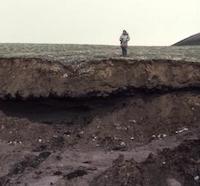PLOS Biology Published April 9, 2019 | 14:00 EDT (News release from PLOS) A coin toss has exposed a problem that may affect many biomedicine studies. In many of these studies, small sample sizes and frequent loose thresholds for accepting statistical significance can lead to high rates of false-positive results and overestimation of true effects. Contrary to […]
April 9, 2019 | SMCC Heads Up 
Mars probed | Bad news for Canada’s official bird | HIV innards revealed | April 9, 2019 | SMCC Heads Up – Embargoed and recently published research with a Canadian focus, curated by SMCC for science journalists. Read more>
Increased competition drives males to age faster 
Proceedings of the Royal Society B: Biological Sciences Published April 3, 2019 | 17:01 EDT (Brief from the Royal Society) If we fall apart as we age because we allocate so much energy to trying to reproduce that we don’t look after our bodies, then males that have to compete more vigorously should age faster. In […]
Losing a mating match boosts loser’s sperm competitiveness 
Proceedings of the Royal Society B: Biological Sciences Published April 3, 2019 | 17:01 EDT (Brief from the Royal Society) When researchers tested the mating success of winners and losers in a variety of mating competitions, they found that winners are better at acquiring mates, but losers perform better in sperm competition. These results have important […]
Slippery slopes: Climate change is reshaping the Arctic landscape 
Nature Communications Published April 2, 2019 | 11:15 EDT (News release from University of Ottawa) The number of landslides caused by melting permafrost ice on Banks Island, in the Canadian Arctic, increased from 63 in 1984 to 4,077 in 2013. More than 85 per cent of the slumps occurred just after four particularly warm summers. The […]

April 2, 2019 | SMCC Heads Up 
Slippery Arctic slope | Mating aging | Winners & losers | April 2, 2019 | SMCC Heads Up – Embargoed and recently published research with a Canadian focus, curated by SMCC for science journalists. Read more>
Early observations from near-Earth asteroid Bennu 
Nature Geoscience and Nature Astronomy Published March 19, 2019 13:30 EDT (News release from Nature Research Press) Early observations from instruments aboard NASA’s OSIRIS-REx spacecraft confirm the presence of widespread and abundant hydrated minerals on near-Earth asteroid Bennu and the unexpected presence of numerous, large boulders, suggesting that Bennu is between 100 million and one billion years […]
How geography shaped North American Indigenous languages 
Proceedings of the Royal Society B: Biological Sciences Published March 27, 2019 | 17:01 EDT (Brief from the Royal Society) Researchers modelled North American language diversity at time of European contact, using influences such as topography, rivers, climate change since the last Ice Age, precipitation, and other ecological factors, to gain insight into the factors that […]
Prepare for drought conditions in southern Canada as the Arctic warms
Nature Published March 27, 2019 | 14:00 EDT When Arctic regions warmed relative to equatorial regions beginning about 12,000 years ago, temperate regions saw substantially less rain- and snowfall, researchers say. Palaeoclimate records from the end of the last Ice Age to some 5,000 years ago and climate simulations indicate that weakening temperature gradients led to […]
March 26, 2019 | SMCC Heads Up 
Arctic warming, southern drought | What drives language dispersal | March 26, 2019 | SMCC Heads Up – Embargoed and recently published research with a Canadian focus, curated by SMCC for science journalists. Read more>
Freeze-tolerant insects draw on a range of protectant molecules 
Proceedings of the Royal Society B: Biological Sciences Published March 20, 2019 17:01 EDT (Brief from the Royal Society) Low temperatures kill most animals, but some insects can survive ice forming inside their bodies. Researchers tested how small-molecule cryoprotectants work the freeze-tolerant spring field cricket, showing that different cryoprotectants have unique impacts on freeze tolerance. The information […]
Trouble in the OR: Clinicians report assault, verbal abuse, intimidation 
Canadian Journal of Anesthesia Published March 19, 2019 21:00 EDT Canadian and U.S. clinicians experienced almost 1,000 physical assaults in operating rooms in 2012–2014. Verbal threats and other forms of intimidation occurred. Clinicians working as nurses, working in privately funded clinics, or who were young, inexperienced, female, or non-heterosexual were most likely to experience abuse. A […]

Daily use and high-potency cannabis linked to higher rates of psychosis 
The Lancet Psychiatry Published March 19, 2019 19:30 EDT (News release from The Lancet) In cities where high potency cannabis is widely available, such as London and Amsterdam, a significant proportion of new cases of psychosis are associated with daily cannabis use and high-potency cannabis. The authors estimate that one in five new cases (20.4%) of psychosis […]
March 19, 2019 | SMCC Heads Up 
Asteroid observations | Ice-resistant bugs | Young, risky sex | March 19, 2019 | SMCC Heads Up – Embargoed and recently published research with a Canadian focus, curated by SMCC for science journalists. Read more>
Why some young adults engage in unsafe sex 
Journal of Sex Research Published March 19, 2019 00:00 EDT (News release from Taylor & Francis Group) Gender, sexual orientation, and the desire to form lasting romantic relationships appear to influence sexual risk-taking among young adults. This is the first study to directly compare how heterosexual men, heterosexual women, and homosexual men differ in their approach […]
Otters leave their own archaeological records 
Scientific Reports Published March 14, 2019 14:00 EDT (News release from Nature Research Press) Sea otters leave distinct wear patterns on the rocks that they use to break open hard-shelled food. The patterns, which can be recognised using archaeological techniques, could help trace locations of previous sea otter populations that are now extinct. Images and video […]
